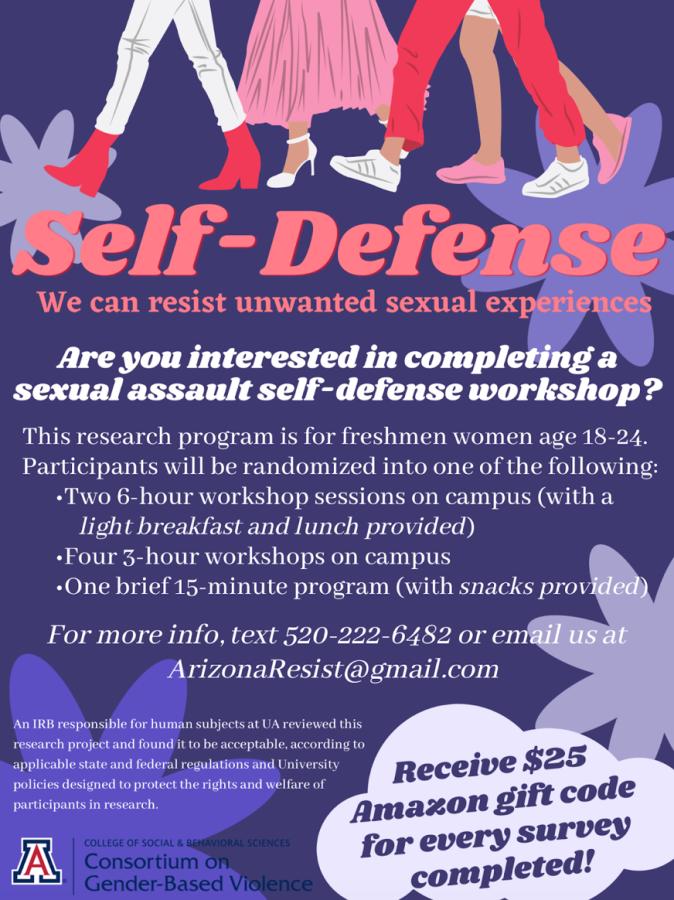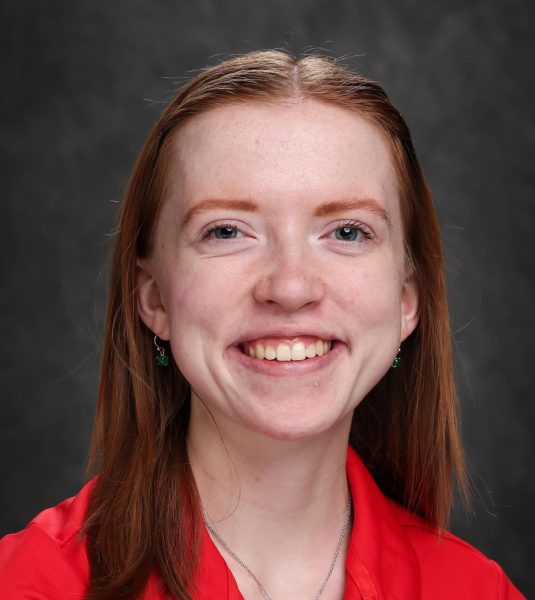Researchers at the University of Arizona are working to change the conversation and gender biases around sexual assault with the Enhanced Assess, Acknowledge, Act Sexual Assault Resistance program.
The EAAA, or “flip the script” program started in the spring and is a campus-oriented sexual assault program open to freshman women at the UA.
Elise Lopez, the study’s principal investigator and director of the Consortium on Gender-Based Violence in the College of Social and Behavioral Sciences, said that one of the study’s primary goals is “about changing the script on gender norms around how women should act in a relationship and intimate situations.”
According to a UA News press release, the “Assess” stage of the program focuses on teaching women how to assess threats of sexual assault by men they know.
The “Acknowledge” stage revolves around recognizing the danger in certain situations and overcoming “emotional barriers to resisting unwanted sexual behaviors.”
The “Act” stage teaches participants self-defense and resistance strategies.
The final “Sexuality and Relationships” stage provides information and resources about healthy sexual relationships and “encourages participants to explore their own sexual attitudes, values and desires, and to develop strategies for sexual communication.”
As evidenced by the final step of the program, Sexuality and Relationships, the study focuses not only on prevention but also on sexual empowerment, according to Lopez.
“It’s also about empowering women to be able to identify and stand up for the sex that they do want,” Lopez said. “Rape prevention isn’t just about here’s what not to do. It’s about what we want as sexual beings and how we have happy, healthy, consensual sexual relationships.”
The program was initially started in Canada, and according to a study published in the New England Journal of Medicine, was proven to decrease the “occurrence of rape, attempted rape, and other forms of victimization among first-year university women.”
Priscila Ledezma, a facilitator of the EAAA program at the UA, is optimistic that the study at the UA will see similar results to that in Canada.
“Seeing the results in Canada, participants feel empowered to do things and resist sexual assault. And I think we are going to see that here. I think we are going to replicate those findings,” Ledezma said.
Facilitators like Ledezma go through extensive training before they lead the program and relay lessons to participants. This training involves content review as well as lessons in self-defense.
Apart from the self-defense training and empowerment elements of the programming, participants are also shown a variety of resources and support on the UA campus and in the greater Tucson community, according to Ledezma.
Although as of right now the program is only offered to freshmen, inclusivity is still a focal point of the study.
“It’s not just for cisgender women, our study program is also open to trans women, or non-binary folks who identify more on the femme side, if they would like to join this program,” Lopez said.
The information relayed through this program does not only reach those who participate. Those in charge of EAAA at the UA are also working with students, professors, groups on campus and groups within the community to spread awareness and knowledge about sexual assault prevention.
“EAAA is effective, but it’s only one piece of the puzzle,” Lopez said. “We do workshops for clubs and classrooms. We have a new training that we’re doing for all of the RAs in the residence halls. So this past summer, we trained all new RAs in sexual assault prevention so that they can bring that information back to student residence. We are starting a new program with Greek life where we’re going to be doing sexual assault prevention that’s specific to Greek life students. We’re starting to do some work with athletics. So you know, really, a comprehensive solution has to include components that are targeted towards specific groups, but also universal prevention.”
The universality of these lessons, not just about sexual assault but also about healthy relationships, sexual health and sexual empowerment, is something that researchers leading the EAAA are trying to emphasize. Changing the conversation surrounding sexual assault requires an awareness of these other teachings as well, which can benefit all students regardless of gender, sexual orientation or age.
“Everybody can use good information about sex and getting consent and how to have a healthy relationship. And a lot of us didn’t get that information growing up, a lot of high schools don’t necessarily teach comprehensive sex ed. And even if they do, they don’t really talk about things like alcohol and sex or how you deal with jealousy or conflict in relationships so that it doesn’t lead to dating violence or stalking,” Lopez said. “What if you have a friend who has been sexually assaulted? Or maybe you’re a guy and you notice that one of your friends is kind of aggressive toward women? How do you step in and say something to them? What do you say? All of this stuff is part of sexual assault prevention. That is good information for everybody.”
The EAAA program goes beyond just sexual assault prevention. The study takes a holistic approach to how people view sexual relationships and sexual violence, especially within the context of a college campus.
Follow Sam Parker on Twitter









